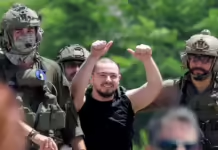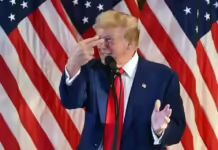
The International Court of Justice, the United Nations’ highest judicial body, has issued a landmark ruling demanding Israel immediately cease its military operations in Rafah.
More than seven months into the Gaza conflict, this decision was made on Friday and is likely to increase international pressure on Israel.
According to AFP, the International Court of Justice’s ruling mandates that Israel “immediately halt its military offensive, and any other action in the Rafah Governorate, which may inflict on the Palestinian group in Gaza conditions of life that could bring about its physical destruction in whole or in part.”
In addition, Israel was ordered by the court to maintain the Rafah crossing open so that humanitarian aid can be provided “unhindered.”
Despite being legally binding, the ICJ does not have any means of enforcement. This constraint was made clear by an earlier directive to Russia to stop its invasion of Ukraine, which was ignored.
Israel justified its actions by claiming that ending hostilities would give Hamas extremists more power and impede efforts to free hostages kidnapped during the group’s deadly attack on October 7.
This decision comes soon after the International Criminal Court made another big legal step.
ICC Prosecutor Karim Khan declared on Monday that he would be requesting arrest warrants for prominent Israeli and Hamas figures, charging them with crimes against humanity and war crimes connected to the Gaza conflict and the October 7 attack.
Read Also:
Israel fiercely disputes South Africa’s allegation that Israel’s Gaza offensive violated the 1948 UN Genocide Convention, which prompted the ICJ case last year. The ICJ had already commanded Israel to take all appropriate precautions to avert acts of genocide in Gaza in January.
The humanitarian crisis in Gaza has prompted repeated appeals from South Africa for the ICJ to impose additional emergency measures. In March, the court mandated that Israel ensure the “unhindered provision at scale” of humanitarian aid.
In recent public hearings, South Africa’s ambassador Vusimuzi Madonsela accused Israel of escalating its “genocidal onslaught” across Gaza.
South Africa argued that only a complete halt to Israel’s military operations would allow sufficient humanitarian aid to alleviate the crisis.
Israel dismissed these allegations as an “obscene exploitation of the most sacred convention,” with their legal representative Gilad Noam stating that South Africa’s portrayal of events was “completely divorced from the facts and circumstances.”
He argued that calling the situation genocide repeatedly does not make it so.
Israel has acknowledged the suffering of Gaza’s civilian population in spite of the accusations, and it asserts that it has taken major steps to boost the supply of humanitarian aid.
Diplomatic efforts are still underway to secure the hostages’ release and negotiate a ceasefire. Amid mounting domestic pressure for the release of hostages, Israel declared that it was prepared to pick up the stalled talks with Hamas.
In order to resume talks, U.S. intelligence chief Bill Burns is anticipated to meet with Israeli representatives in Paris.
Since October 7, when Hamas launched its unprecedented attack on Gaza, over 1,170 people—mostly civilians—have died and 252 hostages have been taken hostage in the conflict. The health ministry of Gaza reports that at least 35,800 people have died as a result of Israel’s retaliatory strikes, the majority of whom were civilians.












